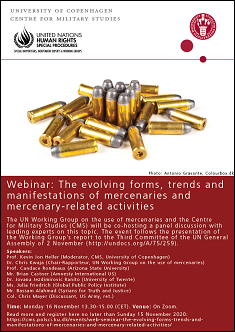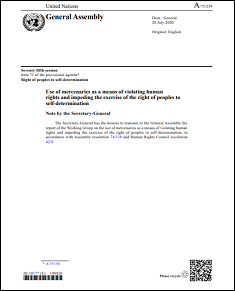Webinar: The evolving forms, trends and manifestations of mercenaries and mercenary-related activities

The UN Working Group on the use of mercenaries and the Centre for Military Studies (CMS) will be co-hosting a panel discussion with leading experts on the evolving forms, trends and manifestations of mercenaries and mercenary-related activities. The event follows the presentation of the Working Group’s report to the Third Committee of the UN General Assembly of 2 November (http://undocs.org/A/75/259).
Speakers:
Prof. Kevin Jon Heller (Moderator, CMS, University of Copenhagen)
Dr. Chris Kwaja (Chair-Rapporteur, UN WG on the use of mercenaries)
Prof. Candace Rondeaux (Arizona State University)
Mr. Brian Castner (Amnesty International US)
Dr. Jovana Jezdimirovic Ranito (University of Twente)
Ms. Julia Friedrich (Global Public Policy Institute)
Mr. Bassam Alahmad (Syrians for Truth and Justice)
Col. Chris Mayer (Discussant, US Army, ret.)
Time:
Monday 16 November 2020 at 13:30-15:00 (CET).
Venue:
On Zoom. When you have registered for this event, you will receive an email with a zoom-link.
Registration:
Please register here no later than 15 November 2020. (Registration is closed).
If you missed this event, you can hear the webinar in its full length here.
Background:
The report of the Working Group examines the evolution of the use of mercenaries and related actors against developments in the nature of contemporary armed conflicts, in addition to challenges for the implementation of the relevant international and regional legal frameworks pertaining to mercenaries. The report enumerates a broad range of actors and activities that may be considered mercenary-related and notes that special consideration should be paid to the specific context and conditions in which these actors operate.
The report outlines the impact these actors and activities have on the enjoyment of human rights, including the right to self-determination, and the respect of international humanitarian law. In particular, the Working Group sheds light on the pervasive secrecy and opacity surrounding mercenary and mercenary-related activities. It also cautions against the practice of States of using them as a tool to influence armed conflicts abroad, while denying involvement and circumventing legal responsibilities. These dimensions represent a major obstacle to accountability and effective remedy.


